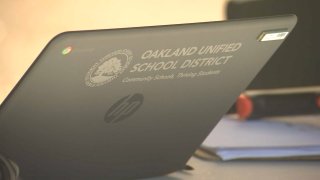
A pandemic-era coalition aimed at helping Oakland public school students learn is expanding its vision, the coalition #OaklandUndivided formally announced Friday.
What began as an effort to ensure Oakland school children could learn as their families coped with COVID-19 will expand to ensure all students from pre-kindergarten to college have access to a computer, the internet and culturally competent tech support.
The coalition is also aiming to expand broadband access in Oakland.
"We are not slowing down," Oakland Mayor Libby Schaaf said at the announcement Friday afternoon at Martin Luther King Jr. Elementary School on 10th Street in Oakland. "We are doubling down."
The coalition's plan has a price tag of $12 million. Amazon and Gilead Foundation have each given $1 million. The PG&E Corporation Foundation has given $250,000. #OaklandUndivided started as a response to the need to keep Oakland students learning as they sheltered in place.
"It was really a huge area of stress," said Oakland Unified School District Superintendent Kyla Johnson-Trammell.
Many students did not have the basic resources to learn remotely.
Local
But, by the end of the 2020-21 school year, #OaklandUndivided joined the community together, raising web access from 12 percent to 98 percent among to public school students from low-income families.
That work involved giving out more than 29,000 laptop computers, more than 10,000 hotspots and responding to more than 10,000 requests for technical support.
Get a weekly recap of the latest San Francisco Bay Area housing news. Sign up for NBC Bay Area’s Housing Deconstructed newsletter.
Those numbers are even higher now and the work continues.
#OaklandUndivided is aiming to close the gap completely by providing web access, a computer and tech support to the other 2 percent of low-income families with public school children.
#OaklandUndivided is also expanding access to be sure all 50,000-plus Oakland public school students, from pre-K to college, have the same resources.
"What you all are doing here is absolutely amazing," said Scott Adams, deputy director of broadband and digital literacy at the California Department of Technology.
"This is a model for other cities and towns" in the state, Adams added.
Disconnected homes are primarily low-income and Black and Hispanic homes, said Geoffrey Starks, a commissioner with the Federal Communications Commission.
Starks traveled from Washington, D.C. to attend the announcement.
Some have said, "The future is already here. It's just not evenly distributed," Starks remarked.
He said work must be done to invert that. He said to consider him as part of the coalition.
The work extends beyond school students to the broader community.
Building on two efforts including a $7.7 million investment of the city's CARES Act money, #OaklandUndivided in five years aims to connect 90 percent of the estimated 36,000 unconnected households in the city.
"We're talking about the opportunity divide," Schaaf said. "This is what we're closing."



